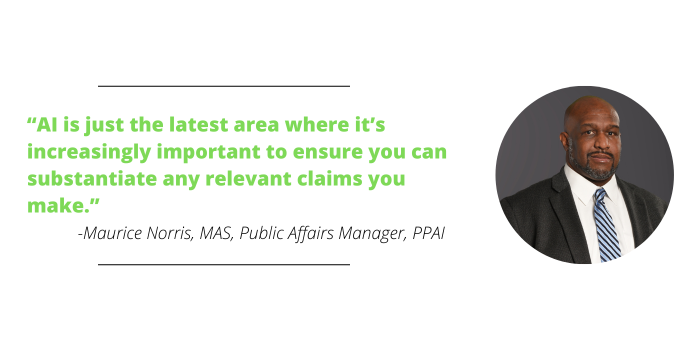Promo Firms Must Avoid ‘AI Washing’ Or End Up In SEC’s Crosshairs

As more companies turn to artificial intelligence (AI) to enhance their business operations, it’s vital that they avoid “AI washing” – the latest target of the U.S. Securities and Exchange Commission (SEC).
- More than half of PPAI 100 distributors (59%) and suppliers (55%) use AI in their business operations, according to PPAI Research.
During the Messenger AI Summit in December, SEC Chair Gary Gensler warned companies against AI washing, comparing it to the practice of “greenwashing,” where a company's environmental or sustainability-related statements are misleading or false, the Wall Street Journal reported.
“Don't do it,” Gensler said, emphasizing that securities laws require “full, fair and truthful” disclosures.
What Is ‘AI Washing?’
AI washing refers to the practice of claiming products or services are AI-powered when they’re not.
Considering the technology’s relative youth, it’s easy for companies to commit AI washing unknowingly. After all, AI is often used as a “catch-all” term. But literally speaking, it only refers to tech that exhibits some level of learning, adapting and automating, according to international law firm Bracewell LLP.
“Technologies providing advanced automation and statistical analysis aren’t necessarily considered AI,” “For example, while chatbots have become ubiquitous on consumer-facing websites, such technology generally isn’t AI, but consists of automated preprogrammed answers in response to common questions. Similarly, targeted online advertising isn’t AI, but merely utilizes an algorithm to analyze online search queries to generate matching ads.”
Government Crackdown
Last year, the Federal Trade Commission (FTC) advised companies to keep their AI claims “in check,” announcing that it would be looking for exaggerations and baseless claims of AI products’ capabilities.
Maurice Norris, MAS, public affairs manager at PPAI, says that tech industry leaders endorsed the idea of federal agencies promulgating new regulations regarding AI last year.
“In the absence of congressional action or new agency rules,” Norris says, “regulators are using existing authority to address concerns about a relatively new technology. This just reinforces what we already know, which is, what companies say about their products and processes matter. AI is just the latest area where it’s increasingly important to ensure you can substantiate any relevant claims you make.”

In October, President Joe Biden issued an executive order that established new standards for AI safety and security. Among Biden’s goals with the executive order are:
- Prioritizing federal support for accelerating the development and use of privacy-preserving techniques.
- Developing principles and best practices to mitigate the harms and maximize the benefits of AI for workers.
- Catalyzing AI research across the United States through a pilot of the National AI Research Resource and expanded grants for AI research in vital areas, like healthcare and climate change.
Congress may also weigh in on this topic soon. “A bipartisan congressional working group was recently formed to examine the use of AI for product development, compliance and several other areas,” Norris says.
The AI Working Group will explore how AI is impacting the financial services and housing industries, including the development of new products and services, fraud prevention, compliance efficiency and the enhancement of supervisory and regulatory tools.
- The group will also examine how existing regulation addresses the use of AI and how lawmakers can ensure that any new regulations consider both the potential benefits and risks associated with AI.

